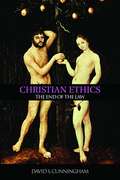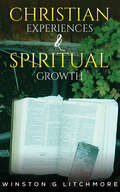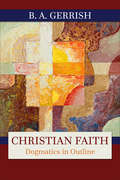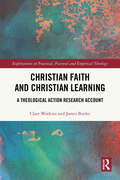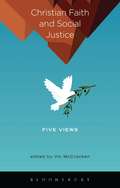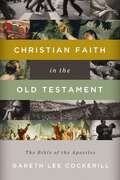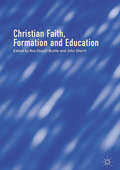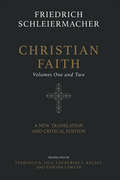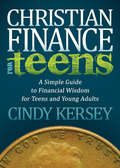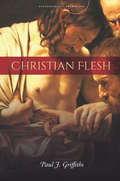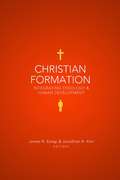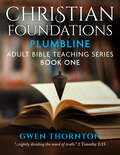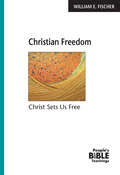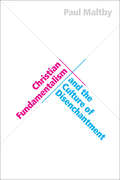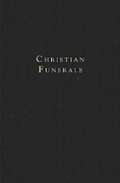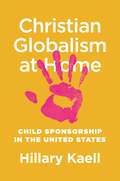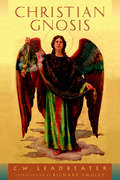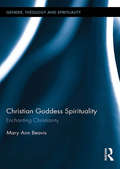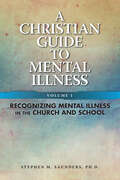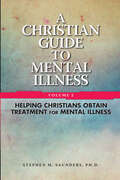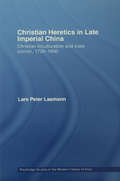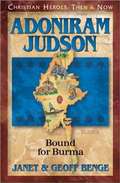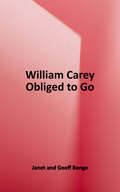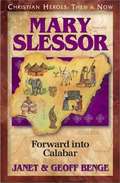- Table View
- List View
Christian Ethics: The End of the Law
by David S. CunninghamChristian Ethics provides a biblical, historical, philosophical and theological guide to the field of Christian ethics. Prominent theologian David S. Cunningham explores the tradition of ‘virtue ethics’ in this creative and lively text, which includes literary and musical references as well as key contemporary theological texts and figures. Three parts examine: the nature of human action and the people of God as the ‘interpretative community’ within which ethical discourse arises the development of a ‘virtue ethics’ approach, and places this in its Christian context significant issues in contemporary Christian ethics, including the ethics of business and economics, politics, the environment, medicine and sex. This is the essential text for students of all ethics courses in theology, religious studies and philosophy.
Christian Experiences & Spiritual Growth
by Winston G LitchmoreChristian Experiences & Spiritual Growth addresses the search for satisfaction with heart and soul happiness. God and being a Christian are seen as its sources. The book defines who is a Christian and how to become one. It dodges none of the trials and temptations in the Christian life but explains how that God as Father, Jesus as Saviour and the Holy Spirit as Guide, Teacher and Comforter, constantly help towards victory, growth, and maturity. Prayer, reading and obeying God’s Word have a pivotal role in the experiences of satisfaction and happiness and the truth that every Christian has a home in heaven is cheering. Readers will gain spiritual knowledge and be able to correct erroneous practice as they read through the book with the Bible alongside, paying attention to the scriptural references on subject areas, put suggestions into practice appropriately and grow spiritually. Reading the book over many sittings will be more profitable than attempting to rush through it. I have employed an explanatory strategy for ease of understanding. For example, I have explained the meaning of some words, phrases, and terms in the body of the book and set out comparative tables to illustrate narratives in the text. These can be used for quick references and reminders.
Christian Faith
by B. A. GerrishThe classic work of Christian theology, which seeks to present the Christian faith in its entirety. Schleiermacher was equally at home in the theological systems of Protestant orthodoxy and the new world of thought shaped by the historical and natural sciences and German philosophy. He follows a confident course through the entire range of themes in dogmatics but leaves both the dogmatic task and the individual themes transformed by a powerful and original mind. A new foreword by B. A. Gerrish summarises the dogmatic goals of The Christian Faith and corrects some common misreadings of his work.
Christian Faith and Christian Learning: A Theological Action Research Account (Explorations in Practical, Pastoral and Empirical Theology)
by Clare Watkins James ButlerFollowing a critical analysis of the pedagogical theology and practice of Christian learning, this book develops a radical alternative account of ‘faith learning’. Recognising the ways in which institutionally anxious churches are turning to processes of education and ‘discipling’, it takes the reader through a theological action research journey to offer a practical–theological response to the question of how Christian faith is learnt and handed on in ways that really make a difference. Through close engagement with the practicalities of one declining denomination (British Methodism), the authors offer a distinctive vision of Christian learning and enable fresh thinking and practice. There is a call for a move beyond educational ‘courses’ towards a more profound engagement with the complexities of real life as not only the place but the ‘matter’ of faith learning. Theologically, the book offers a vision which pursues questions of divine and human agency, the work of the Spirit in ‘learning’, the role of normative tradition, and the important place of Christian lay people and their daily lives in learning. Ultimately, it seeks to give substance to a fresh concept of ‘faith learning’, which is holistic, integrative, and inductively achieved, and finds its fulfilment in lives lived in faith, hope, and love.
Christian Faith and Social Justice: Five Views
by Vic McCrackenThe Judeo-Christian tradition testifies to a God that cries out, demanding that justice "roll down like waters, righteousness like an ever-flowing stream" (Amos 5:24). Christians agree that being advocates for justice is critical to the Christian witness. And yet one need not look widely to see that Christians disagree about what social justice entails. <P><P> What does justice have to do with healthcare reform, illegal immigration, and same-sex marriage? Should Christians support tax policies that effectively require wealthy individuals to fund programs that benefit the poor? Does justice require that we acknowledge and address the inequalities borne out of histories of gender and ethnic exclusivity? Is the Christian vision distinct from non-Christian visions of social justice? Christians disagree over the proper answer to these questions. In short, Christians agree that justice is important but disagree about what a commitment to justice means.
Christian Faith in the Old Testament: The Bible of the Apostles
by Gareth Lee CockerillSometimes it is easy to view the Old Testament as difficult to apply to our day-to-day lives. As contemporary Christians, we may even wonder whether it is possible for us to establish our apostolic roots in the Old Testament.Christian Faith in the Old Testament helps us complete this daunting task with ease. In this intriguing and informative study, Gareth Lee Cockerill helps us view the New Testament as a fulfillment of the Old Testament, giving us a broad perspective on Scripture as a whole. In language that is easily accessible to the layperson, Gareth explores the role of each major part of the Old Testament Canon and what part each plays in the total scope of biblical revelation. Additionally, Christian Faith in the Old Testament offers important guidance to contemporary believers about how each part of the Old Testament Canon applies today. This book is the perfect choice for intelligent modern Christians looking to discover their apostolic roots in the Old Testament. Features include:Understand how the Old Testament applies to life todayDiscover the contemporary Christian&’s apostolic roots in the Old TestamentGain a broad perspective on Scripture as a whole
Christian Faith, Formation and Education
by Ros Stuart-Buttle John ShorttThis book discusses the relationship between faith, formation and education. Rooted in a variety of discourses, the book offers original insights into the education and formation of the human person, both theoretical and practical. Issues are considered within a context of contemporary tensions generated by an increasingly pluralist society with antipathy to religious faith, and debated from interdenominational Christian perspectives. Including chapters by an international team of experts, the volume demonstrates how Christian faith holds significance for educational practice and human development. It argues against the common assumption that there can be a neutral approach to education, whilst at the same time advocating a critical dimension to faith education. It brings fresh thinking about faith and formation, which demands attention given the fast-changing political, educational and socio-cultural forces of today. It will appeal to students and researchers involved in Christian educational practice.
Christian Faith: A New Translation And Critical Edition (T&t Clark Cornerstones)
by Friedrich SchleiermacherThe classic work of Christian theology, which seeks to present the Christian faith in its entirety.Schleiermacher was equally at home in the theological systems of Protestant orthodoxy and the new world of thought shaped by the historical and natural sciences and German philosophy. He follows a confident course through the entire range of themes in dogmatics but leaves both the dogmatic task and the individual themes transformed by a powerful and original mind. A new foreword by B. A. Gerrish summarises the dogmatic goals of The Christian Faith and corrects some common misreadings of his work.
Christian Finance for Teens: A Simple Guide to Financial Wisdom for Teens and Young Adults (Morgan James Faith)
by Cindy KerseyMany parents aren&’t sure where to begin when it comes to teaching their teens and young adults about finances. Christian Finance for Teens will help, giving important information in a way teens can understand about job searching, budgeting, debt, banking, investing, insurance, taxes, and other areas of finance. Author Cindy Kersey has taught a high school finance class (Christian Finance) for tenth- and twelfth-grade students for several years, &“road-testing&” her material on real-world teens to amazing results. Inspired to help other young people, she turned her course curriculum into book format so teens and young adults everywhere can easily understand concepts of personal finance. This material will be useful as they begin their lives as adults.
Christian Flesh (Encountering Traditions)
by Paul J. GriffithsA sustained and systematic theological reflection on the idea that being a Christian is, first and last, a matter of the flesh, Christian Flesh shows us what being a Christian means for fleshly existence. Depicting and analyzing what the Christian tradition has to say about the flesh of Christians in relation to that of Christ, the book shows that some kinds of fleshly activity conform well to being a Christian, while others are in tension with it. But to lead a Christian life is to be unconstrained by ordinary ethical norms. Arguing that no particular case of fleshly activity is forbidden, Paul J. Griffiths illustrates his message through extended case studies of what it is for Christians to eat, to clothe themselves, and to engage in physical intimacy.
Christian Formation: Integrating Theology and Human Development
by James R. Estep Jonathan H. KimFor Christian education professors and students, Christian Formation provides a composite view of human development and learning from integrated theory, theology, and educational practices in the church.
Christian Foundations: Plumbline Adult Teaching Series, Book One (Plumbline Adult Teaching Series #1)
by Gwen Thornton"Study to shew thyself approved unto God, a workman that needeth not to be ashamed, rightly dividing the word of truth." ~2Timothy 2:15 KJVWhen you build your life on a foundation of Bible teaching, you can withstand anything that comes your way. A solid biblical foundation produces steadfast faith, wisdom, success, and an eternity with God.Pastor Gwen Thornton leads readers through a concise study of crucial Bible topics, including creation, the fall of man, the answer to sin, the trinity, Satan, the lineage of Christ, the birth of Israel, angels, and more.The format is designed for groups, churches, home study groups, and church schools. Easy to read and rich in revelation, this faith-filled curriculum will impact new believers and seasoned veterans alike.A sure foundation in Christ and a life built on the Bible will always be rewarded with God's abundant favor and blessings.About the AuthorGwen Thornton and her husband, Philip Thornton, are founding pastors of Legacy Faith Church in Harrisburg, Pennsylvania.Mrs. Thornton has taught Bible curriculum to students from toddlers to adults. She writes her own curriculum because of the lack of high-quality Bible-based materials.A perpetual student of the Bible, Mrs. Thornton makes the study of the Old and New Testaments and teachings of Jesus Christ the foundation upon which her life is based.In answering her call to ministry, Pastor Gwen Thornton believes in a collective responsibility to raise children and adults with a sound spiritual foundation for their daily life.
Christian Freedom: Christ Sets Us Free (People's Bible Teachings)
by William E FischerWhat does “sanctification” mean? What does “justification” mean?For many people, sanctification and justification are just obscure religious words. But through this book, you will come to understand what these words mean—and how they’re crucial parts of your Christian faith and life.Author and pastor William E. Fischer hopes that through Christian Freedom, you will have a greater appreciation of the God who has created you, his Son who has freed you, and his Spirit who has made Christian freedom your personal possession.Bible-based teachings and various freedoms that all Christians have which are not defined in the Bible are also examined in this helpful book!The People’s Bible Teachings is a series of books on all the main teachings of the Bible. Following the pattern set by The People’s Bible series, these books are written for all Christians in an easy-to-read manner. The authors of The People’s Bible are all pastors and professors who have had years of experience teaching others about the Bible.
Christian Fundamentalism and the Culture of Disenchantment
by Paul MaltbyWithin the familiar clash of religious conservatism and secular liberalism Paul Maltby finds a deeper discord: an antipathy between Christian fundamentalism and the postmodern culture of disenchantment. Arguing that each camp represents the poles of America's virulent culture wars, he shows how the cultural identity, lifestyle, and political commitments of many Americans match either the fundamentalist profile of one who cleaves to metaphysical and authoritarian beliefs or the postmodern profile of one who is disposed to critical inquiry and radical-democratic values.Maltby offers a critique that operates in both directions. His use of the resources of postmodern theory to contest fundamentalism's doctrinal claims, ultra-right politics, anti-environmentalism, and conservative aesthetics informs his engagement with contemporary fundamentalist painting, spiritual warfare fiction, dominionist attitudes to nature, and a profoundly undemocratic interpretation of Christianity. At the same time, Maltby identifies some of fundamentalism’s legitimate spiritual concerns, assesses the cost of perpetual critique, and exposes the deficit of spiritual meaning that haunts the culture of disenchantment.
Christian Funerals
by Andy LangfordUnlike weddings, funerals rarely take place after extensive planning. Often the deceased is not someone the pastor has known well, and preparations for the service of death and resurrection take place in the midst of pastoral care of the grieving, writing the funeral sermon, and the pastor’s regular duties. These circumstances make it especially hard to plan an appropriate and meaningful order of worship for the funeral service.Christian Funerals will help pastors as they attend to this crucial ministry of the church. Drawing on the books of worship from a number of denominations and traditions, it provides several options for each of the elements of the funeral service, from gathering texts to opening prayers to scripture lessons to final prayers. The book is bound in a way that makes it suitable for use at church services and at the grave side.
Christian Globalism at Home: Child Sponsorship in the United States
by Christian Global Hillary KaellAn exploration of how ordinary U.S. Christians create global connections through the multibillion-dollar child sponsorship industryChild sponsorship emerged from nineteenth-century Protestant missions to become one of today’s most profitable private fund-raising tools in organizations including World Vision, Compassion International, and ChildFund. Investigating two centuries of sponsorship and its related practices in American living rooms, churches, and shopping malls, Christian Globalism at Home reveals the myriad ways that Christians who don’t travel outside of the United States cultivate global sensibilities.Kaell traces the movement of money, letters, and images, along with a wide array of sponsorship’s lesser-known embodied and aesthetic techniques, such as playacting, hymn singing, eating, and fasting. She shows how, through this process, U.S. Christians attempt to hone globalism of a particular sort by oscillating between the sensory experiences of a God’s eye view and the intimacy of human relatedness. These global aspirations are buoyed by grand hopes and subject to intractable limitations, since they so often rely on the inequities they claim to redress.Based on extensive interviews, archival research, and fieldwork, Christian Globalism at Home explores how U.S. Christians imagine and experience the world without ever leaving home.
Christian Gnosis
by Richard Smoley C W LeadbeaterThen shall the candidate be bound upon the wooden cross . . . After the third day he shall be brought back from the dead and carried up to heaven to be on the right hand of Him from whom he came. Surprisingly, these lines are from an Egyptian initiation ritual thousands of years before the Christian drama. Linking the two is just one fascinating element in this profound introduction to esoteric Christianity, as timely today as when it was first published in 1920. Famed clairvoyant Charles Webster Leadbeater was a bishop of the Liberal Catholic Church, which preserves the sacraments while interpreting the scriptures with maximum freedom. He quotes St. Augustine himself saying that what we now call Christianity emerged at the very beginning of humanity as the one true religion. To access its transformative force, Leadbeater returns to original teachings and decodes its story symbolically as a guide for direct knowledge (Gr: gnosis) of the Divine. "As Christ had the Godhead behind Him, so have we the same power, although not yet unfolded as fully," he says. "Nevertheless, it is only a question of development, and that development is certain." With the authority of a scientist and a mystic, he addresses such topics as the birth of Christ in the heart; God's utter love; divine grace; angelic help; the true meaning of salvation; and reincarnation and the evolution of the soul.
Christian Gnosis
by Richard Smoley Charles Webster LeadbeaterThen shall the candidate be bound upon the wooden cross . . . After the third day he shall be brought back from the dead and carried up to heaven to be on the right hand of Him from whom he came. Surprisingly, these lines are from an Egyptian initiation ritual thousands of years before the Christian drama. Linking the two is just one fascinating element in this profound introduction to esoteric Christianity, as timely today as when it was first published in 1920. Famed clairvoyant Charles Webster Leadbeater was a bishop of the Liberal Catholic Church, which preserves the sacraments while interpreting the scriptures with maximum freedom. He quotes St. Augustine himself saying that what we now call Christianity emerged at the very beginning of humanity as the one true religion. To access its transformative force, Leadbeater returns to original teachings and decodes its story symbolically as a guide for direct knowledge (Gr: gnosis) of the Divine. "As Christ had the Godhead behind Him, so have we the same power, although not yet unfolded as fully," he says. "Nevertheless, it is only a question of development, and that development is certain." With the authority of a scientist and a mystic, he addresses such topics as the birth of Christ in the heart; God's utter love; divine grace; angelic help; the true meaning of salvation; and reincarnation and the evolution of the soul.
Christian Goddess Spirituality: Enchanting Christianity (Gender, Theology and Spirituality)
by Mary Ann BeavisThis monograph focuses on "Christian Goddess Spirituality" (CGS), the phenomenon of (mostly) women who combine Christianity and Goddess Spirituality, including Wicca/Witchcraft. Mary Ann Beavis’s study provides ethnographic data and analysis on the lived religious experience of CGS practitioners, drawing on interviews of over 100 women who self-identify as combining Christianity and Goddess spirituality. Although CGS also has implications for Goddess Spirituality and related traditions (e.g., Neopaganism, Wicca), here, CGS is considered primarily as a phenomenon within Christianity. However, the study also shows that the fusion of Christian and Goddess spiritualties has had an impact on non-Christian feminist spirituality, since Goddess-worshippers have often constructed Christianity as the diametrical opposite and enemy of the Goddess, to the point that some refuse to admit the possibility that CGS is a valid spiritual path, or that it is even possible. In addition, biblical, Jewish and Christian images of the divine such as Sophia, Shekhinah, the Virgin Mary, and even Mary Magdalene, have found their way into the "Pagan" Goddess pantheon. The main themes of the study include: overlaps and differences between Christian feminist theology and CGS; the routes to CGS for individual practitioners, and their beliefs, practices and experiences; proto-denominational classifications ("spiritual paths") within CGS; CGS thealogy (Christian discourse about the female divine); and the future of CGS in social scientific and ecclesiological context. Christian Goddess Spirituality will be of interest to scholars of religion, especially those with interests in women and religion, feminist spiritualities, feminist theology/thealogy, alternative spiritualities, New Religious Movements, and emergent Christianities.
Christian Guide To Mental Illness Vol 1: Recognizing Mental Illness in the Church & School
by Stephen M SaundersHow do Christians deal with mental illness?Mental illness is a major problem for many people in society—male or female, young or old, religious or atheist.Christians are certainly no exception; yet, unfortunately, the same stigma surrounding mental illness in society is present in Christian circles too. The first in a two-volume set from author Dr. Stephen Saunders, this book takes an in-depth look at mental illness while also offering grace and encouragement from God’s Word. Saunders describes many common mental afflictions in great detail, including their symptoms, risk factors, and the effects they can have on loved ones. Saunders then presents you with key biblical principles—sin and grace, law and gospel, and others—to show that God is in control and has not deserted those who suffer.By reading this book, you’ll be better prepared to help your loved ones endure whatever mental trials they might be facing.
Christian Guide To Mental Illness Vol 2: Helping Christians Obtain Treatment for Mental Illness
by Stephen M SaundersHow many people suffer from mental illness?Did you know that one in five people, including Christians, will suffer from a mental illness in any given year? This shocking statistic means that many churches will have families who are affected by and struggling with mental illness.This second entry in a two-volume set about mental illness by Dr. Stephen Saunders will help you respond to these difficult circumstances and directing Christian brothers and sisters to the care and support they need, while also reminding them of their Savior’s love.A Christian Guide to Mental Illness, Volume 2 details how core ideas about mental illnesses and their treatments have changed over time. The book also offers guidance to pastors and church workers who wish to provide practical assistance to the people they serve.You will learn how to begin the vitally important conversation on mental illness, prepare for crisis management, recognize the need for professional treatment, assist loved ones, and share with everyone impacted by mental illness the spiritual comfort that only comes from God’s Word.As he did in Volume 1, Dr. Saunders demonstrates in this book a thorough understanding of essential Christian teachings. Both church leaders and church members will find assistance and encouragement in this book as they reach out to family and friends affected by mental illness.
Christian Heretics in Late Imperial China: Christian Inculturation and State Control, 1720-1850 (Routledge Studies in the Modern History of Asia)
by Lars Peter LaamannFollowing the prohibition of missionary activity after 1724, China's Christians were effectively cut off from all foreign theological guidance. The ensuing isolation forced China's Christian communities to become self-reliant in perpetuating the basic principles of their faith. Left to their own devices, the missionary seed developed into a panoply of indigenous traditions, with Christian ancestry as the common denominator. Christianity thus underwent the same process of inculturation as previous religious traditions in China, such as Buddhism and Judaism. As the guardian of orthodox morality, the prosecuting state sought to exercise all-pervading control over popular thoughts and social functions. Filling the gap within the discourse of Christianity in China and also as part of the wider analysis of religion in late Imperial China, this study presents the campaigns against Christians during this period as part and parcel of the campaign against 'heresy' and 'heretical' movements in general.
Christian Heroes - Then And Now - Adoniram Judson: Bound for Burma
by Janet Benge Geoff BengeAs America's first foreign missionary, Adoniram Judson spent thirty-eight years working in Burma, then one of the most hostile countries on earth. Judson was ignored, mocked, beaten, and tortured, yet he never lost sight of his goal to translate the Bible into the Burmese language. Today, over 150 years after his death, his remains the only translation of the Bible in Burmese.
Christian Heroes - Then And Now - William Carey: Obliged To Go (Christian Heroes Ser.)
by Janet Benge Geoff BengeWilliam Carey, "the father of modern missions," displayed a single-minded determination to bring the gospel to the people of India (1761-1834).
Christian Heroes - Then and Now - Mary Slessor: Forward into Calabar
by Janet Benge Geoff BengeWhile many missionaries died within months, this fiery mill worker from Scotland labored in love among the unreached tribes of Africa's Calabar region for thirty-nine years (1848-1915).
